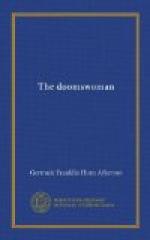“How did you know that I came?” she asked; and it was not the stars that lit her face.
“You do little that I do not know. Have you been to confession?”
“Yes.”
They walked slowly down the valley.
“And you forgave and were forgiven?”
“Yes. Ay! but my penance is heavy!”
“But when it is done you will be at rest, I suppose.”
“Oh, I hope! I hope!”
“Have you begun to realize that your Church cannot satisfy you?”
“No! I will not say that.”
“But you know it. Your intelligence has opened a window somewhere and the truth has crept in.”
“Do not take my religion from me, senor!” Her eyes and voice appealed to him, and he accepted her first confession of weakness with a throb of exulting tenderness.
“My love!” he said, “I would give you more than I took from you.”
“No! never!—Even if we were not enemies, and I had not made that terrible vow, my religion has been all in all to me. Just now I have many things that torment me; and I have asked so little of religion before—my life has been so calm—that now I hardly know how to ask for so much more. I shall learn. Leave me in peace.”
“Do you want me to go?” he asked. “If you did,—if I troubled you by staying here,—I believe I would go. Only I know it would do no good: I should come back.”
“No! no! I do not want you to go. I should feel—I will admit to you—like a house without its foundation. And yet sometimes, I pray that you will go. Ay! I do not like life. I used to have pride in my intelligence. Where is my pride now? What good has the wisdom in my books done me, when I confess my dependence upon a man, and that man my enemy—and the acquaintance of a few weeks?” She was speaking incoherently, and Estenega chafed at the restraint of the servants so close behind them. “Tell me,” she exclaimed, “what is it in you that I want?—that I need? It is something that belongs to me. Give it to me, and go away.”
“Chonita, I give it to you gladly, God knows. But you must take me, too. You want in me what is akin to you and what you will find nowhere else. But I cannot tear my soul out of my body. You must take both or neither.”
“Ay! I cannot! You know that I cannot!
“I ignore your reasons.”
“But I do not.”
“You shall, my beloved. Or if you do not ignore you shall forget them.”
“When I am dead—would that I were!” She was excited and trembling. The confession had been an ordeal, and Estenega was never tranquillizing. She wished to cling to him, but was still mistress of herself. He divined her impulse, and drew her arm through his and across his breast. He opened her hand and pressed his lips to the palm. Then he bent his face above hers. She was trembling violently; her face was wild and white. His own was ashen, and the heart beneath her arm beat rapidly.




